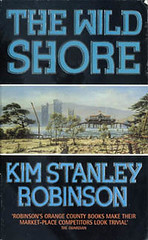Thursday, June 23, 2005

Title:The Wild Shore
Author: Kim Stanley Robinson
Publisher: Harper Collins
Henry is 17-years-old and lives with his father in a windowless hut. His father makes a living stitching clothes together, and Henry brings in fresh fish every day working with the local fishermen. In his spare time he hangs out with his friends, dreaming of the world and having adventures, thanks particularly to the lessons he gets from old man Tom. Though the swap meets are the highlight of community life, where various villages get together and trade their excess produce.
However life changes for Henry and the residents of Onofre with the arrival of two agents from San Diego, who have arrived come by "train", looking to recruit for the American Resistance. In 1984 America was destroyed. Nuclear bombs were driven into 2000 cities and set off all at once. Since then the United Nations has had America under quarantine, and off the coast of California Japanese ships enforce this order.
The Wild Shore would appear to be the first novel by Kim Stanley Robinson, which is quite a remarkable thought. Especially when considering Ice Henge, a more "genre" orientated novel, that seems to have been published a year after The Wild Shore. Ironic given that The Wild Shore so clearly defines the voice of Kim Stanley Robinson, the themes so evident in the bulk of the work he has done since.
The Wild Shore is the first of what is considered to be a trilogy, though in the most nominal sense - published over a period of 10 years, interspersed with other work. The Orange County or Three Californias trilogy all focus on an individual vision of the future of America using Orange County as an example. The only other contribution to this series that I had read previously was the third volume, Pacific Edge, which looks at an America where corporations have been dismantled and people have control on a more community and environmental basis.
To a degree The Wild Shore provides a similar result, people living in self-contained and self-sustaining communities. But this result is not a voluntary one; America has been hit by a terrorist attack. An idea, in a novel from 1983, that has a particular resonance, given the current world climate. To a degree there is a certain element of the novel that is dated, a couple of references to the Soviet Union - but those are beside the point, with quarantine being enforced by Canada and Japan at the behest of the United Nation, with speculation as to who is actually responsible for the act touching on Africa and Russia.
In fact, the idea that there is no real answer to who attacked America is one of the things I find the most interesting about this novel. The narrative being, to some degree, about identity, both personal and cultural. The characters are faced with the question of what is America, what was America, what should America become? The San Diegans talk of America as god's country, coming out with a jingoistic and patriotic spiel. Which in some circles is met with sympathy and support, but for others the idea of being able to feed yourself each day is more important than that of striking back at a remote world. While some authors might be content to paint pictures of America's greatness, KRS is prepared to argue with that, offer contradictions - the old man in the community is one of the few that remembers life before the explosions, and he paints the picture of America as both a great nation and a selfish, consuming monster.
Along with these kind of questions The Wild Shore is an adventure story, with something of the Boy's Own Adventure story cropping up. Henry getting to travel on a train for the first time, making daring escapes, searching through ruins, and spying on the "enemy". Which makes for some fun reading, but at the same time he is stopping and asking - is this stuff that is happening to him, or stuff he is making happen? With this comes the idea of story telling, and how that fits into culture - the community sitting around the fire telling stories, scraping together the remains of an old culture to save books, and to print new ones again. There is even a passing reference to creation myth, which is coupled with the idea of radiation born super heroes.
The Wild Shore is a post-apocalyptic novel, though it fits more into the category of what is currently being called Mundane Science Fiction that some of the other comparable material that comes to mind. Kathleen Ann Goonan's Queen City Jazz has the same kind of post-event feel, though it comes more from a technological singularity, tracing backwards to Crescent City Rhapsody and an extra-terrestrial "first strike", the kind of effect that can also be detected in Greg Egan's Quarantine. By comparison The Wild Shore is more man made, in what could be thought of as the classic Cold War mode.
I enjoyed The Wild Shore, more so than some of his recent work. Though Forty Signs Of Rain had some of the potential that this has, and I am looking forward to the follow up Fifty Degrees Below to see how that goes.
Comments:
Post a Comment
 this is the voice of re:mote induction.
this is the voice of re:mote induction.